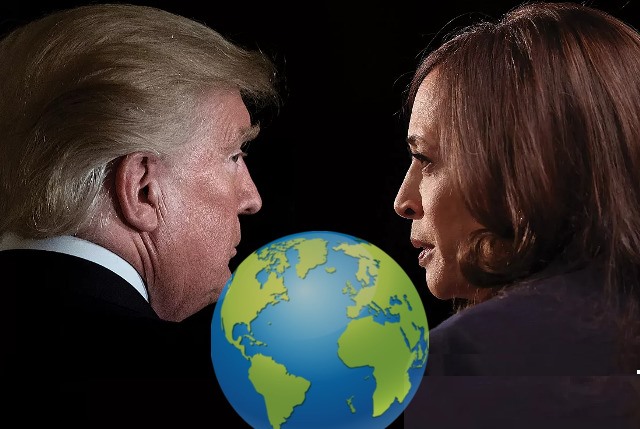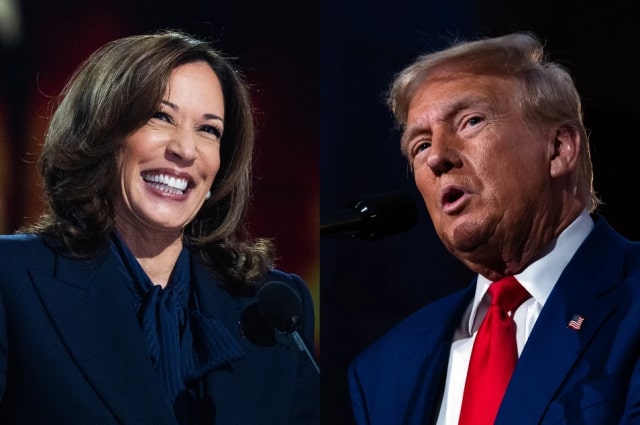Around the world there is interest in the United States elections. India awaits, so does China, Russia, European Union, Great Britain and Middle East among many. They do for different reasons. While Americans have their own priorities in deciding who they elect, the impact of the United States worldwide on economy and international politics is what draws keen following of the candidates outside USA.
Foreign policy is said not to feature much in the American electorate. Immigration, domestic economy, jobs, prejudices, taxation etc are foremost in the minds of the American electorate. However, it is not entirely correct to say that Americans are not concerned about the image and influence of United States worldwide when assessing the Presidential candidates.
Donald Trump made US tendency for unnecessary and costly interventions in ‘other people’s affairs’ one of the key pitches in the 2016 elections. This time he has again brought Ukraine and Middle East into the debates claiming that if he had been president, Russia would not have attacked Ukraine and that he could solve the Middle East issue. Kamla Harris accuses Trump of reducing US influence in the international sphere, abandoning friends and American values in favour of dictators and tyrannical governments.
In these two different positions lie the different ideological approaches of the two candidates and the impact they are likely to have in international affairs. It is that which concerns countries like China, Russia, India and Europe among others.
Kamla Harris is still a creature of the Democratic party. The Democratic Party is a well established machine with linked think-tanks, internal policy groups and forums, advisors and a bureaucratic set up that requires its candidates to work with and promote party line. It is not Kamla Harris who decides policy at whim, but a set of machinery through which policy passes and is approved or supported. True that every candidate needs to show that he or she is bringing a new perspective and a new direction, but it is the machine that comes up with ideas and policies that appear to be different.
In foreign affairs however, the Democratic party is rooted in ideology promoting democracy and liberal values around the world with some pragmatic adjustments. It splashes money around, its aid to developing countries comes with a demand to transforming into democratic polity and observing human rights as well as capitalism. Where it doesn’t work, Democrats are interventionists, financing internal coups, or directly sending its army to ‘improve the conditions of the people’. Democrats have the approach of crusaders for democratic liberal values.
However, democrats are also pragmatic where powerful countries such as Saudi Arabia and China are concerned and strategic interests are served with non-intervention. In much of the Middle East, the USA has cosy relationships with stable absolute Monarchies where little if any democracy exists. In fact it has defence pacts with them with substantive chunk of US army stationed there. Its interests are to ensure supply of oil and to have influence in the Middle East.
Democrats have a long history of interventionist foreign policy and starting wars. Usually they haven’t been successful. But driven by ideology in international relations, it is difficult for a Democrat President to ignore the pressure from NGOs, media and think-tanks when human rights situation in a country becomes dire. At the least, a Democratic President is not expected to be comfortable with ‘bad’ countries such as China, Iran and Russia among others.
Historically Republicans haven’t been much different although their motives are not as altruistic as the Democrats. The Bush administration was quite interventionist after 9/11. Republican policies are motivated by the need to install ‘friendly’ regimes and preferential access to resources.
Donald Trump is however his own man. He is not bound by consensus within the party, think-tanks, human rights organisations, media etc. He doesn’t seem to much care about Republic party’s priorities in foreign policy. He has ripped apart US international relations theories.
From his last tenure as President, it appears Trump’s foreign policy is founded on three pillars. The first is transactional. He prefers to negotiate the US position and look for advantage to America. He is not bothered by the nature of the government, as he showed last time when visiting Saudi Arabia or shaking hands with Kim Jong Un of North Korea.
Secondly Trump is determined to maintain United States dominance rather than cultural or political hegemony. He will increase defence spending if he thought other countries are leaving the USA behind. In transactional Foreign Policy, Trump believes in negotiating with a strong hand.
Thirdly, he is non-interventionist. Trump has said that wars abroad are expensive and drain on resources. He probably thinks that these wars reduce US standing, prestige and ability to negotiate. He is a realist rather than an idealist. He has adjusted to a changed world order.
ALSO READ: Is This The America World Wants To See?
Trump has already hinted that he will end the Ukraine war. The general expectation is that he will stop sending arms and force Ukraine to negotiate for peace, even from a weaker hand. It will remain to be seen how he manages the Israel-Palestinian conflict. Chances are he is likely to turn to Israel and tell it to stop the war, negotiate and move on. He is also likely to tell Palestinian Hamas to recognise Israel and take what it gets.
The Democrats haven’t quite moved on from the cold war. That period was ideological conflict between Capitalism represented by the USA, and Communism represented by the Soviets. As the Soviet fell and Communism faded, the cold war resumed over democracy and human rights in one corner and semi democracies and dictatorships on the other. Democrats still run proxy wars. This time they had Ukraine fighting to bring down Putin with the hope that Russia will become weaker and more compliant.
Europeans too are still stuck with a cold war approach to international affairs, seeing the ‘good us’ and the ‘evil other’. They like Kamla Harris and don’t seem to be keen on Trump. European foreign policy is still clouded with ideological intentions to transform the world into a ‘better’ place for all under European tutelage. Their interactions in Ukraine have all the hallmarks of a bygone era.
But Russia is not the real opposition now. The ideology conflicts are the past. The new world order is a tension between the still ideological west and the no nonsense China. China has no intention of engaging in ideological conflicts. It doesn’t want western democracy and it is not exporting Chinese form of Government anywhere. It has a businesslike approach. It has arisen from a poorly developing country to be the second most powerful country, predicted to overtake USA.
Trump seems more adept at understanding the new world order. He said he doesn’t want to change the world into ‘our image’. His positioning in international affairs is closer to China now. He understands that ideology isn’t important anymore. In shaking hands with Kim Jong Un he was possibly trying to prize away North Korea from its deeper link with and dependency on China.
Kamla Harris is still a better person for most Americans, but for the international community, Trump might be a better President as he will avoid interventions, avoid ideological tensions and play the transaction game in international affairs.
Trump does scare some countries due to his unpredictability. But that is part of his strategic approach to assess what will work best. Whereas, as Putin said, Democrats are predictable as they are driven by ideology. The world has changed, the United States hasn’t caught up yet. Trump is more likely to bring it to speed.
For more details visit us: https://lokmarg.com/

